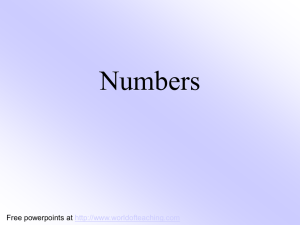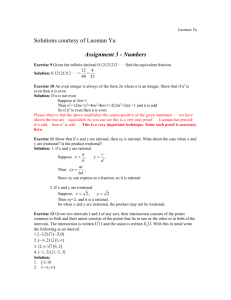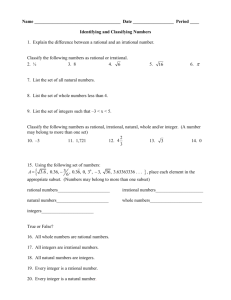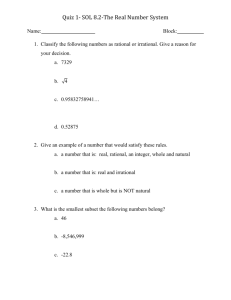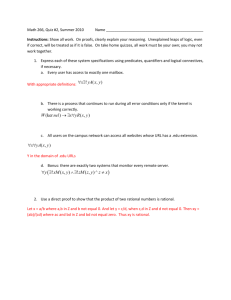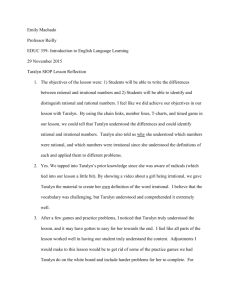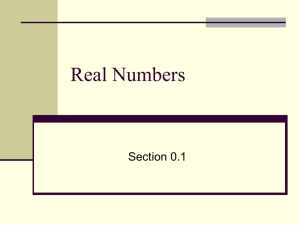Solutions to Problems, Section 0.1
advertisement
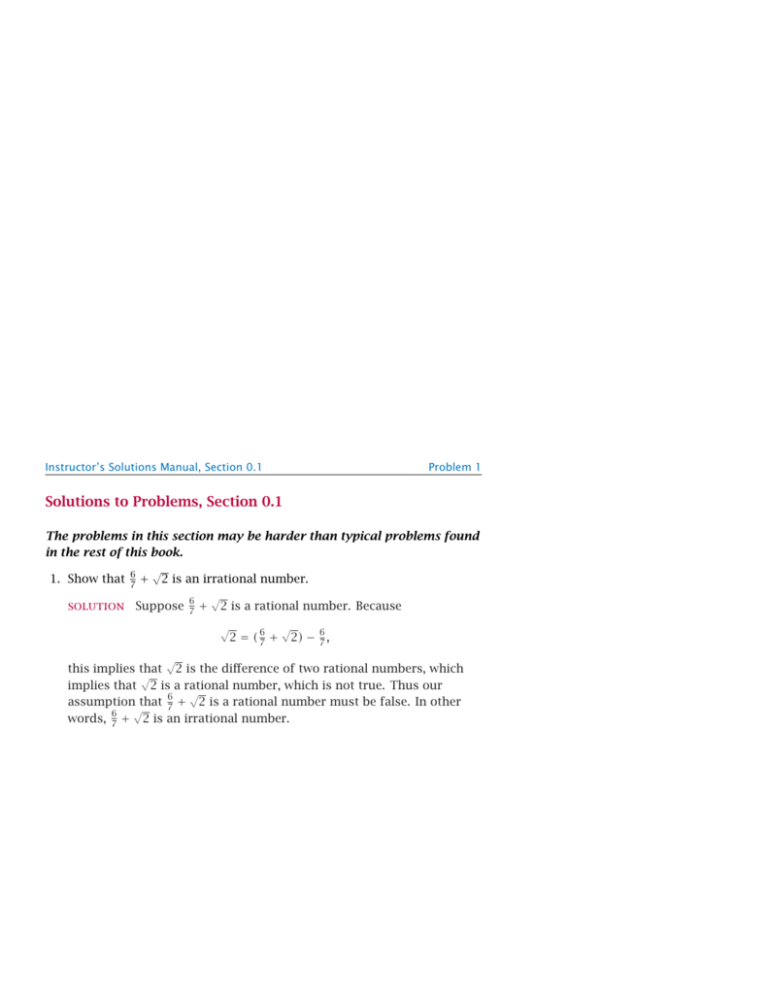
Instructor’s Solutions Manual, Section 0.1 Problem 1 Solutions to Problems, Section 0.1 The problems in this section may be harder than typical problems found in the rest of this book. √ 1. Show that 67 + 2 is an irrational number. √ 6 solution Suppose 7 + 2 is a rational number. Because √ √ 2 = ( 67 + 2) − 67 , √ this implies that 2 is the difference of two rational numbers, which √ implies that 2 is a rational number, which is not true. Thus our √ 6 assumption that 7 + 2 is a rational number must be false. In other √ 6 words, 7 + 2 is an irrational number. Instructor’s Solutions Manual, Section 0.1 2. Show that 5 − Problem 2 √ 2 is an irrational number. √ solution Suppose 5 − 2 is a rational number. Because √ √ 2 = 5 − (5 − 2), √ this implies that 2 is the difference of two rational numbers, which √ implies that 2 is a rational number, which is not true. Thus our √ assumption that 5 − 2 is a rational number must be false. In other √ words, 5 − 2 is an irrational number. Instructor’s Solutions Manual, Section 0.1 Problem 3 √ 3. Show that 3 2 is an irrational number. √ solution Suppose 3 2 is a rational number. Because √ √ 3 2 , 2= 3 √ this implies that 2 is the quotient of two rational numbers, which √ implies that 2 is a rational number, which is not true. Thus our √ assumption that 3 2 is a rational number must be false. In other √ words, 3 2 is an irrational number. Instructor’s Solutions Manual, Section 0.1 4. Show that √ 3 2 5 Problem 4 is an irrational number. solution Suppose √ 3 2 5 is a rational number. Because √ √ 3 2 5 · , 2= 5 3 √ this implies that 2 is the product of two rational numbers, which √ implies that 2 is √a rational number, which is not true. Thus our 3 2 assumption that 5 is a rational number must be false. In other words, √ 3 2 5 is an irrational number. Instructor’s Solutions Manual, Section 0.1 Problem 5 √ 5. Show that 4 + 9 2 is an irrational number. √ solution Suppose 4 + 9 2 is a rational number. Because √ √ 9 2 = (4 + 9 2) − 4, √ this implies that 9 2 is the difference of two rational numbers, which √ implies that 9 2 is a rational number. Because √ √ 9 2 , 2= 9 √ this implies that 2 is the quotient of two rational numbers, which √ implies that 2 is a rational number, which is not true. Thus our √ assumption that 4 + 9 2 is a rational number must be false. In other √ words, 4 + 9 2 is an irrational number. Instructor’s Solutions Manual, Section 0.1 Problem 6 6. Explain why the sum of a rational number and an irrational number is an irrational number. solution We have already seen the pattern for this solution in Problems 1 and 2. We can repeat that pattern, using arbitrary numbers instead of specific numbers. Suppose r is a rational number and x is an irrational number. We need to show that r + x is an irrational number. Suppose r + x is a rational number. Because x = (r + x) − r , this implies that x is the difference of two rational numbers, which implies that x is a rational number, which is not true. Thus our assumption that r + x is a rational number must be false. In other words, r + x is an irrational number. Instructor’s Solutions Manual, Section 0.1 Problem 7 7. Explain why the product of a nonzero rational number and an irrational number is an irrational number. solution We have already seen the pattern for this solution in Problems 3 and 4. We can repeat that pattern, using arbitrary numbers instead of specific numbers. Suppose r is a nonzero rational number and x is an irrational number. We need to show that r x is an irrational number. Suppose r x is a rational number. Because x= rx r this implies that x is the quotient of two rational numbers, which implies that x is a rational number, which is not true. Thus our assumption that r x is a rational number must be false. In other words, r x is an irrational number. Note that the hypothesis that r is nonzero is needed because otherwise we would be dividing by 0 in the equation above. Instructor’s Solutions Manual, Section 0.1 Problem 8 8. Suppose t is an irrational number. Explain why number. 1 t is also an irrational solution Suppose 1t is a rational number. Then there exist integers m and n, with n = 0, such that m 1 = . t n Note that m = 0, because 1 t cannot equal 0. The equation above implies that t= n , m which implies that t is a rational number, which is not true. Thus our 1 assumption that t is a rational number must be false. In other words, is an irrational number. 1 t Instructor’s Solutions Manual, Section 0.1 Problem 9 9. Give an example of two irrational numbers whose sum is an irrational number. √ √ solution Problem 7 implies that 2 2 and 3 2 are irrational numbers. Because √ √ √ 2 + 2 2 = 3 2, we have an example of two irrational numbers whose sum is an irrational number. Instructor’s Solutions Manual, Section 0.1 Problem 10 10. Give an example of two irrational numbers whose sum is a rational number. solution Note that √ √ 2 + (5 − 2) = 5. Thus we have two irrational numbers (5 − whose sum equals a rational number. √ 2 is irrational by Problem 2) Instructor’s Solutions Manual, Section 0.1 Problem 11 11. Give an example of three irrational numbers whose sum is a rational number. solution Here is one example among many possibilities: (5 − √ 2) + (4 − √ √ 2) + 2 2 = 9. Instructor’s Solutions Manual, Section 0.1 Problem 12 12. Give an example of two irrational numbers whose product is an irrational number. solution Here is one example among many possibilities: (5 − √ √ √ 2) 2 = 5 2 − 2. Instructor’s Solutions Manual, Section 0.1 Problem 13 13. Give an example of two irrational numbers whose product is a rational number. solution Here is one example among many possibilities: √ √ √ 2 (3 2) 2 = 3 · 2 = 3 · 2 = 6.


